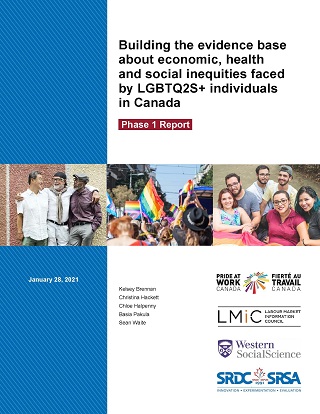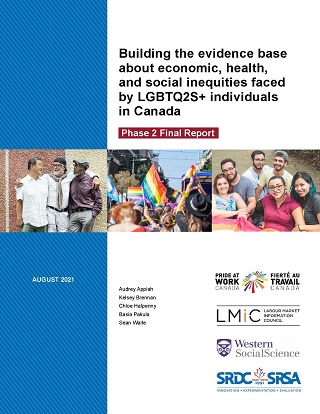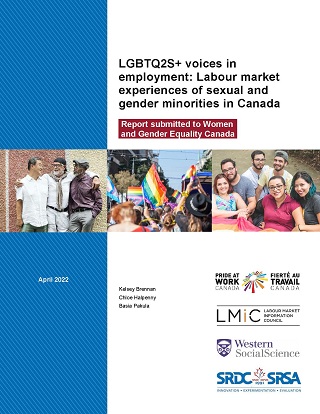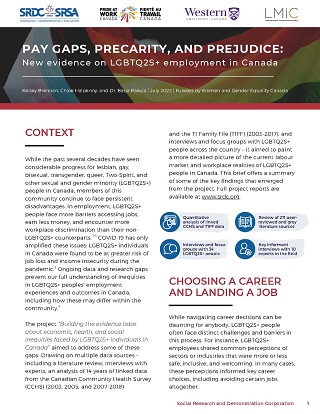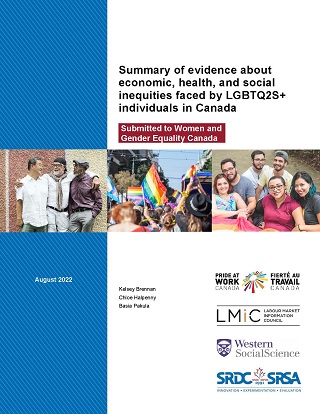August 2022
Building the evidence base about economic, health and social inequities faced by LGBTQ2S+ individuals in Canada
As a group, gender and sexual minorities in Canada – including lesbian, gay, bisexual, transgender, queer, and Two-Spirit (LGBTQ2S+) self-identified people – are more likely to live in poverty, face greater barriers to employment (including stigma and discrimination), and earn less at work, despite often having higher levels of education than their cisgender, heterosexual counterparts.
These reports present findings from the project Building the evidence base about economic, health, and social inequities faced by LGBTQ2S+ individuals in Canada, funded by Women and Gender Equality Canada, and carried out by Social Research and Demonstration Corporation in collaboration with Dr. Sean Waite at the University of Western Ontario, Pride at Work Canada, and the Labour Market Information Council.
View the reports
Phase 1 report
This report documents the Phase 1 findings of the project Economic, health and social inequities faced by LGBTQ2S+ individuals in Canada, funded by Women and Gender Equality Canada and in partnership with Dr. Sean Waite at the University of Western Ontario, Pride at Work Canada, and the Labour Market Information Council. Authored by the SRDC project team and Dr. Sean Waite, the Phase 1 report communicates the project findings to-date, drawing from grey and peer-reviewed literature, key informant interviews, and a scan of available datasets to begin to describe outcomes and determinants thereof for LGBTQ2S+ individuals in Canada, as well as critically assess the data landscape. Subsequent phases will build on these findings, drawing in quantitative (Phase 2) and qualitative (Phase 3) data and analysis.
Phase 2 Final report
This report presents findings from Phase 2 of the project Building the evidence base about economic, health, and social inequities faced by LGBTQ2S+ individuals in Canada, funded by Women and Gender Equality Canada, and carried out by SRDC in collaboration with Dr. Sean Waite at the University of Western Ontario, Pride at Work Canada, and the Labour Market Information Council. Building on the Phase 1 report, the researchers used 14 years of data from the Canadian Community Health Survey and the T1 Family File to study the relationship between sexual orientation and economic, health, and social outcomes in Canada. The study has found persistent earnings gaps and other inequities experienced by lesbian, gay, and bisexual individuals (LGB) in comparison with heterosexual men; outcomes for bisexual-identified people were consistently the poorest. Drivers of earning disparities experienced by LGB individuals were found to be diverse and interconnected with mental health. Ongoing data gaps in Canada limit our understanding of the full LGBTQ2S+ community.
LGBTQ2S+ voices in employment: Labour market experiences of sexual and gender minorities in Canada
This report presents findings from an in-depth qualitative study with currently- and recently-employed LGBTQ2S+ individuals across Canada, drawing on 49 voices across interviews and focus groups. It provides a nuanced view of LGBTQ2S+ individuals’ lived experiences in employment, key factors influencing employment inequities, and contributors to positive workplace experiences, which have remained largely undocumented in the literature to date. Our findings suggest that the employment experiences of LGBTQ2S+ individuals are commonly characterized by prejudice and discrimination, resulting in labour market inequities that are systemic, mutually-reinforcing with those in other spheres, and compounded by other forms of oppression. Despite this, participants also identified positive employment experiences, offering suggestions and areas for consideration by employers, policymakers, and community organizations.
Pay gaps, precarity, and prejudice: New evidence on LGBTQ2S+ employment in Canada
The project Building the evidence base about economic, health, and social inequities faced by LGBTQ2S+ individuals in Canada aimed to address existing data and research gaps regarding LGBTQ2S+ peoples’ employment experiences and outcomes in Canada. Drawing on multiple data sources – including a literature review, interviews with experts, an analysis of linked data from the Canadian Community Health Survey (CCHS) and the T1 Family File (T1FF), and interviews and focus groups with LGBTQ2S+ people across the country – it aimed to paint a more detailed picture of the current labour market and workplace realities of LGBTQ2S+ people in Canada. This visual executive summary presents a summary of the key findings that emerged from the project.
Summary of evidence about economic, health, and social inequities faced by LGBTQ2S+ individuals in Canada
The findings from this project suggest that LGBTQ2S+ individuals in Canada continue to face economic, health, and social inequities that are systemic and mutually reinforcing. These include but are not limited to greater rates of poverty and homelessness, disparities in annual employment earnings, lower rates of life and job satisfaction, poorer general and mental health, increased stress, higher rates of food insecurity, and lower rates of community belonging. Gender minority and bisexual-identified individuals are among those consistently reporting the poorest outcomes. Our findings point towards solutions in the realm of data, research, and policy to address the observed inequities.





